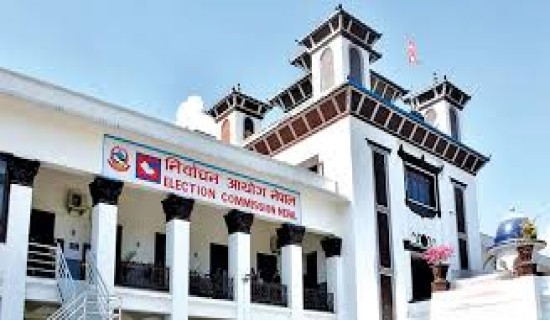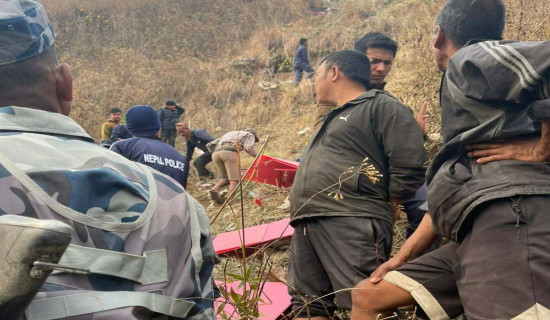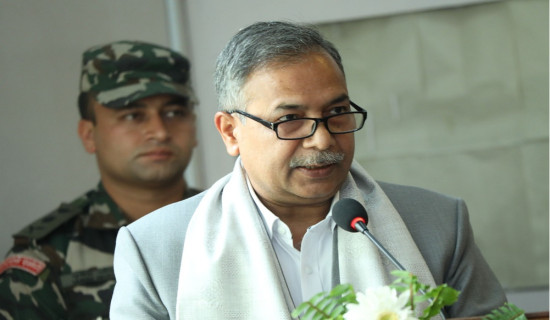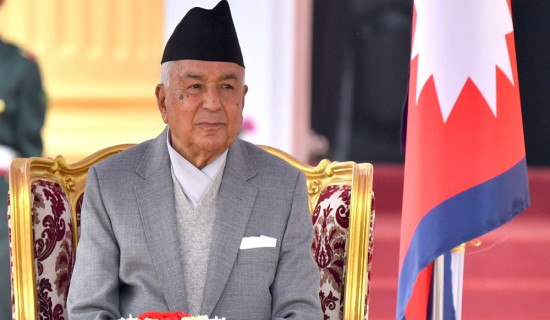- Tuesday, 3 March 2026
Ensuring Political Stability
The vigorous, legitimate and accountable governance is the stamp of political stability. It can pursue the objectives of the constitution without much hindrance. Yet, the permeation of special interest groups both within and outside the polity can easily spoil its impartial performance, impoverish the population, no matter whether the nation is resource rich or scarce, and rear compound sclerosis crushing any veneer of political stability. These special interest groups are powerful lubricants for lobbyists but for the polity and the masses they stoke negative sensation. They have performed a midwifery role in the evolution of Nepali political parties, turned their policy differences indistinguishable and deformed national priorities.
Critical media are diluting the mass appeal of top party leaders colluding with interest groups and openly sponsoring doubt as to whether they are capable of steering Nepalis in difficult times. Only rational leaders, with deep well of courage, confidence and grit, concrete public policy in mind and craftsmanship, can truthfully perceive the static human condition. The remedy of its predicament demands the longing of Nepali people for basic human needs, improving social and economic indicators and cautiously easing geopolitical balance. The purpose of Nepali government is to satisfy rational needs of people and tie together freedom, public order and peace.
Given the sensitive strategic geography, it becomes essential to keep the nation’s right orientation to a shifting regional and global balance of power. The growing multi-polarisation of the world has renewed the value of non-alignment as a viable policy necessity enabling Nepal to exercise the choice of free will and use it to project sovereign identity. It can remove the sign of schizophrenia in foreign policy that has imposed a snag in the nation’s adaptive behaviour.
Policy paralysis
Nepal’s eternal political transition from one set of coalition politics to the other without common background and shared future in the pursuit of public good continues to land it in a quandary arising out of policy paralysis in making comprehensive progress, leaders’ frenzied contest to secure special privileges for one’s own, group or party in the elections and make safe and sound political space for governance. The nation’s deeply entrenched patronage system, malfunctioning public institutions and partisan constitutional bodies cannot rope political stability and justice so long as Nepali leaders do not ensure the integrity of each institution, exclusively rely on legal-rational authority derived from periodic elections, fall short of developing their legitimacy and authority from the delivery of public goods and services to the people.
Any effort to get away from the politics of static infirmness requires Nepali leaders to innovate dynamic policies to find the way of tides of growing personal insecurity to them embedded in their own habits and ways of life. The homogeneity of mental frame and unspoken consensus of the establishment for power monopoly for a long time through an all-party mechanism seems to disentangle now leaving them the constitution only means to move government in a stable direction.
A number of attributes are essential to rope the signs of political stability in Nepal. The first is honest execution of the constitution. The vaunted virtue of constitutionalism is to protect the rights of people and make their lives better and inclusive than before. It is possible if the principles of constitutionalism are earnestly espoused by leadership and sincerely implemented. Likewise, public policies and resources are allocated to this end. But the associative duties corresponding to rights must have enforcing character to safeguard freedom for all. These principles prevent the domination of people by the dominant class, sectional interests and predators and set Nepali politics in the directions as guided by the Directive Principles and Policies of the state.
The current political uncertainty is primarily caused by a drain on the power monopoly of the state and unlawful behaviour of powerful elites, immunity for the political class and a lack of constitutional discipline in every sphere of life. A right to life of people and popular sovereignty demand self-determination in matters affecting them which is a function of civic competence to secure good life and dignity. Civic education is the noble path to make certain that Nepali society will always scrutinise itself on the question of which worldview it would be at ease with and rational to the eyes of the larger world.
The second is keeping the power separation and checks and balances of powers of the institutions of the polity and the state so that dark human nature cannot subvert institutional order, an order central to fairly distribute safety, income and esteem to people. This allows the management of common aspirations for the welfare of all Nepalis in a democratic framework. It is vital to maintain their institutional autonomy and demarcate the jurisdiction to evade certain levels of institutional stress caused either by overload, lack of capacity to discharge specialised responsibilities or pursue decentralised functions of multi-level governance.
In Nepal, however, the executive seems to stifle the autonomy of judiciary while the legislature is only an extension of party politics, representing less the general will of people though its seeks ritualised public hearing of judges, ambassadors and other executive functionaries. Unless its specialised committees are well-equipped with policy relevant knowledge it cannot escape from the command and control system of party politics, parliamentary whip, expulsion and other disciplinary measures to penalise legislators. In such a context, they cannot exercise their conscience and convictions on behalf of national interests and skirt unwanted fears.
The only hope remains the bristling public sphere constituted by a critical mass of Nepalis and media to stir issues up and debate on Nepali politics, law, leadership, economy, political culture and foreign policy beyond special interest groups schmoozing with politicians to curry favour for their enterprises. The third is frequent party consensus to change the constitution to fit leadership passion or justify their capricious, unconstitutional acts. They have devalued Nepali politics, weakened the integrity of law and amplified the ambition of the powerful individuals to flout the rule of law.
Despite many flaws in the scrupulous administration of justice and calls for its reforms including reframing of the judicial council, Nepali judiciary has steadfastly stood in matters of citizenship, vital national issues and protection of the constitution. A weak constitutional safeguards and selective implementation of the constitution does not make Nepali democracy functional and protect the life, liberty and property of people. When the unwritten law of self-interest on money drives leaders in the conventional style of politics, not the written political spirit of constitution and party laws, their political culture will continue to stoke up political instability and their conduct serves as role model for their cadres and supporters to follow suit beyond accepted rules.
The fourth is breaking the trap of leader-oriented factional politics. The cult of leadership worship by cadres and their party-oriented media has thrived in the nation as a means of flattering profound emotional push for self-deference to their all-pervasive power and earn favour for profitable rewards. Total conformity of cadres and supporters has become essential for leaders to cater to their prejudice and expand their political constituency. But such conformity blunts the democratic conscience of people to ask critical questions to their leaders pertaining to valuable roles in pursuing policies vital to common areas of attention affirming democratic virtues. It has troubled the institutionalisation of political parties in terms of ideology, programme, organisation and leadership succession.
A section of critical media and intellectuals are already exposing people to crisis socialisation akin to Sri Lanka for squandering the nation’s precious resources in unproductive activities, piling huge unsettled accounts and burdening with debts and dependence. Nepali people are becoming desperate as to what to do to escape the worst case scenario. The established leaders’ habit-drenched style, not social learning, will continue to leave space for the discontent of dissidents, spur the conservative force, independent figures and those seeking credible political alternatives claiming to represent the will of the nation and people.
Primordial fear
The fifth is that Nepal still faces a natural state of primordial fear and needs deficits. People continue to seek economic security, income and a decent way of living. Without pinning a hope on the national leadership they migrate abroad en masse.
It can be solved by planned management of economic life through productive activities, education, health, job, infrastructure and essential public utilities. Leaders should not leave the whole lot to the calculation of market forces indulged in the survival of fittest and placing order above fulfilling life. They should not leave the fertile fields of political activities to civil society. They are too diverse and less synchronised. They should not leave it to business which is concerned more with the rationalisation of profit than patriotism.
Likewise, they cannot abandon the big picture of policy, law, coordination and collective action to the careerist bureaucracy which is unable to embark on epic nation-building tasks they cannot selflessly devote. It keeps a paternalistic attitude to Nepali people as a giver, not a source of sovereignty. Roping all these actors into a constitutional frame, educating them on constitutional duties and orienting them to the goals of governance can help rope a modicum of political stability.
A full constitutional consciousness of Nepalis can be a solution to their many problems, rectify maladies, address both corrective and redistributive justice for the least advantaged, realise the national vision of the creation of an egalitarian society and advance the nation towards historical goal of national sovereignty and constitutional goal of democratic stability and progress.
(Former Reader at the Department of Political Science, TU, Dahal writes on political and social issues.)











-original-thumb.jpg)




